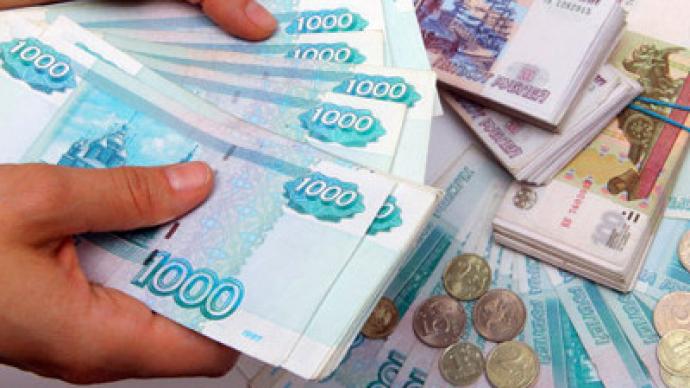Russia in the face of global economic volatility: Natalia Orlova

With the global economic outlook looking increasingly volatile Business RT spoke with Natalia Orlova, Chief Economist at Alfa Bank, about how the various global risks could impact upon Russia and how well prepared Russia is to deal with them.
RT: How likely is it in your opinion that a major sovereign default will occur in the Eurozone, given events in Spain, Italy Portugal Greece and Ireland? What are the implications for Russia? And what are the implications for the European economy and the European banking system?NO:“Well let’s look first at the issue of possible default. My personal take is that obviously for some of the countries like Greece, Portugal, Spain, maybe Italy, the restructuring of the debt is becoming a necessity, just because the accumulated debt to GDP burden is relatively strong, and their collected budget revenues seem to be not enough to cover the servicing of the debt.Now the problem is that I think, within the European and global investment community there is a general understanding that this needs restructuring.The only issue is who has to pay for this, because here we have to look for the bond holders, and for the restructuring for the bondholders.It seems that exposure of important European banks and global banks to the Greece bond market, it has become limited in previous years.I mean obviously it still remains sizeable but it is much less important as opposed to a couple of years ago.My take is that actually Greece is trying to push the European Central Bank, or the major countries in the Eurozone, like Germany and France primarily, rather to take the large participation in the debt restructuring.So overall I don’t believe that default, in the sense of emerging markets – a country just stop playing debt – is possible.We are talking rather about debt restructuring, and here I think the question is that these negotiations have really to agree. So it’s rather the question of compromise and how soon it will take place.” RT: What are the implications for the European economy?NO:“I would say, you know, if we are talking about an economic implication, we have to understand that any deceleration of the growth rate or any pressure within the European zone, in a way, might be a positive for Russia, because for Russia this is a very large import market, Russia is importing a lot from the European Union.So from that sense, obviously I think Russia, in a way, will not suffer, and may even benefit in case of some of the country may become more competitive.From the other side we also know that Europe is a big consumer of Russian gas, while here I guess that probably the European economy will slow down, but not very substantially affect the demand for gas because the gas market is driven by more structural issues, like recent talks about possible other sources of energy.It is definitely a much more important topic, a more important threat for Russian gas.But overall I would say the European situation is mainly affecting Russia through the financial markets, economically the impact will be fairly limited.In the financial market I think the key question now is what will be the reaction of global capital, and if the debt restructure will not trigger an outflow from the emerging markets to the more developed countries, because this is basically the key risk for Russia.The Russian market is benefitting now from some interest on the part of international investors community, because oil prices are high, also because the rouble is relatively stable.But you know this interest is really driven by global factors rather than by Russian economic advantages, thus this perception of Russia as a potentially interesting market maybe soon razed by international global investors in case of any negative surprise from Greece.”RT: Right now we are seeing the end of QE2 in the United States.How does the end of QE2 play out in terms of implications for Russia?Will it do much to reduce inflationary pressure? Will it trigger a downturn in commodity prices? NO:“My take is quite unclear as yet.First, just per se that the Federal reserve is stopping the Quantitative Easing at the moment, is potential a risk that the interest rates in the United Stateshave to go up, just because until very recently the Federal Reserve was participating very significantly at treasury auctions.Now the support to the U.S. bond markets will definitely decline, and as a result it is quite unclear if the international central banks – like the central bank of China or central bank of Russia, or the central banks of the oil exporting countries will be able to offset, to compensate for the decline in demand from the Federal Reserve.If their interest rates go up, in the United States, definitely this will trigger a very negative outcome for the emerging markets because this will be really the call for global capital to come back to the developed countries.In this case it will be very negative.However there is another option that the Federal Reserve will start a new round of quantitative easing – people are talking about Quantitative Easing 3 or 4 or 5 – but overall if global central banks or private sector will not be really able to offset federal reserves, it can be that the federal reserve will be forced to continue the quantitative easing policy.In this case for emerging markets, it will just mean that the situation of excess liquidity will continue, at least for some time.So in this case I think that all of the risks we have discussed will be rather postponed for some time.”RT: Do you think the end of QE2 for some time would affect crude prices?NO:“I think that in a way, yes.If we are looking from a liquidity standpoint, we know that a huge part of liquidity injected by the Federal Reserve really flew to the commodity market, and supported this sort of bubble.So I think that yes this will be the factor depressing oil prices at least for some time.However we also have to understand that a number of oil exporting countries have recently increased their sensitivity to oil prices.What I mean is that in a number of oil exporting countries, their budget break even has increased in recent years, meaning that during the crisis years this country started to spend more than they were spending initially.And thus given the adverse role on global commodity markets we must suspect that they will be interested in keeping oil prices at relatively high levels.While before , for example 5 or 6 years ago, people were saying ‘OK OPEC countries will be satisfied with oil prices of maybe $40-$50/bbl, now it seems that these participants might be interested in having a much higher oil price level – maybe $80-$100/bbl.So I think we have to take into account this factor, because after all the power of suppliers on the commodity market is still relatively strong.”RT: China has been making serious efforts to bring its inflationary problems under control with rate increases and reserve requirements since 2010.Is this likely to see a soft landing for the Chinese economy?What are the implications for Russia of a hard landing?NO:“I think the Chinese economy is quite difficult to analyse, for the reason that we have to rely on Chinese statistics, which are not fully calculated on the international methodology.Thus as a result it is quite hard really to identify how strong the growth rate is at the moment.It seems that inflationary pressure – at least the recent news that we have – requires some tightening.So from that point of view it is true that some tighter policy on the monetary side may be the trigger of some soft or hard landing for the real sector.For Russia the point is that our relationship with China is also very much focussed on the commodity trade.And thus as a result I think that Russia is mainly affected by the reaction of global markets to Chinese soft or hard landing, than directly by the Chinese economy.So I think at the moment China still looks relatively good because to be honest we are talking about Chinese risk for years already.However it is also true that there is a bubble in the real estate market in China, and there is sizeable social risks.It is true that given very modestglobal growth we cannot completely exclude this scenario of Chinese hard landing, which would definitely trigger a correction in the global commodity markets, and as a result it would negatively affect Russia.”RT: The 2008 capital outflow in the wake of Lehman Brothers left corporate Russia exposed needing to fund massive liabilities to international lenders.Would a similar situation be exposed in 2011?Would there be a need for massive government bailouts for either the financial system or major Russian borrowers as there was in 2008?NO:“Well structurally if you are looking at Russia it is true that not a lot of factors have changed, because we still have a relatively strong foreign debt burden, so it is possible that again companies may start accumulating foreign currency to pay the foreign debt.Russia is still dependent on commodity prices – Russia has even increased its exposure to commodity prices, because if you are looking for the budget breakeven level it is now around $120/bbl, if you are looking for the current account breakeven it is around $80/bbl this year.It has substantially increased as opposed to previous years.So as a result we cannot completely exclude the possibility of a negative scenario with some strong capital outflow.In addition we are still in the situation of capital outflow from the beginning of the year, we have lost around $31 billion of capital outflow.In the meantime I think the key question is that we can see the situation similar to the Lehman Brothers case at the global level, because while the Lehman Brothers case came as a complete surprise.Now the regulators across the world are really ready to support their financial system, their banks, or their real sector with huge monetary injections.Thus I think the spheres of the of the possible second Lehman Brothers case seems to be exaggerated. That said we cannot completely exclude the situation of a global slowdown.Maybe some second wave of crisis will come from another source, but at the moment it is quite hard to identify.”RT: But do you think Russia is better prepared now, or is it still difficult to say?NO:“I would say that at least it will not be a complete surprise, because we have to remember that in 2008 Russia was really taken by surprise, with the fact that global prices collapsed.Russia did not experience a capital outflow for a long time before the crisis.At the moment Russian banks have already credit provisions, the Central Bank has already provided the huge support to the banking sector, the budget is still in surplus, we still have the oil revenues flowing to the Reserve Fund.And I think right now, as opposed to 2008, we have tools, we have instruments, we have seen this already once.So I think that the cabinet and Central bank reaction will definitely be faster or more concrete in case of a second crisis.”RT: Do you think we will see some massive bailouts in the financial system?NO:“I would say yes.Definitely the level of risk didn’t decline, and the key reason is because we still don’t see economic growth being back to pre-crisis levels.All the same in the banking sector, the loan growth rate is still not back to pre-crisis levels.So as the economy is delivering a modest growth rate, Russian banks just didn’t have enough time to clean their balance sheet.We see this through the Bank of Moscow situation.I think a number of Russian banks still have the, I would not call them bad loans, but the problem loans, problems which will potentially become bad loans in case of some economic turbulence.So I think we definitely still have some burden in the banking system.”RT: What did the Russian Finance Ministry, Government, Central Bank learn from 2008 meltdown?How would it change things in the event of another major slump?What did it get right?NO:“I think the lesson is simple, and this is the same lesson across the world – that we have not repeated the case of Lehman Brothers, meaning that if you have a big banking player or a big player in your economy, which is in trouble, you rather have to bailout before deciding to send it to bankruptcy, just because in case of bankruptcy you are opening Pandora’s Box.You are opening the window of opportunity for a number of systemic risks which the regulator cannot really control.So this is the lesson learned from 2008, and I think the Russian government, as well as governments across the world are just following this lesson.So this is the reason we are discussing this bailout for Greece, while recently we have seen bailouts for the Bank of Moscow in Russia.This is a general sense that we really have to deal with the psychology of the financial markets, at the same time we don’t really understand the depth of the financial risks. But, that said, I think these risks proved to be true only at the time.At least in Russia we have the government reserves, the Reserve Fund, the Stabilisation Fund, the Central Bank has a lot of central bank reserves. As soon as the country will spend its money, this will not be the case of the United States, but for emerging markets, this definitely will be a call to change its approach.Because a country without such huge reserves will really have to set more pressure on the shareholders, and the government will no longer be able to bailout on the right and on the left.But I think this situation is not yet the reality, so at the moment we are still comfortable having big state funds which would be available in case of second wave of crisis.”RT: Reserves are back near where they were in mid-2008, the budget is nearly balanced with oil at about $100/bbl – does Russia have a safety net?NO:“We still have to understand one point.In 2008 when the crisis came, Russia’s budget breakeven to oil prices was around $60/bbl.With the crisis – because Russia continued social spending, also because tax revenues have declined with the economic slowdown – now we have a budget breakeven with $120/bbl, which is much, much higher.It is true that this year the budget deficit will not be very big, but it is because oil prices will be very high this year.But I would say the implicit budget risk has gone up substantially in the recent couple of years.It is true that we still have the reserve fund, we still have the National Welfare Fund, we have accumulated sufficient funds thanks to prudent macro policy of the early 2000’s, however we have to use these reserves carefully, because we will not have an unlimited amount of money to deal with all the problems.So, in a way we definitely have spent some of our accumulated macro stability to deal with the crisis, and at the moment I still think we have some reserves but we have to be more careful when spending them.”RT: What would be the implications for a period of further downturn or volatility for key strategic Russian government economic policies such as economic diversification, closer integration into the global economy, privatisation and development of the domestic financial system?NO:“We have to really think in terms of the growth rate and I think that the problem now is that the Russian growth rate, well it would still be vulnerable to a global downturn, through declining demand for Russian exports.However the driving force for Russian growth now is internal investment policy.The time Russian doesn’t stimulate internal investment the GDP growth level will stay at 3-4% which will not be enough to recreate or to improve the macro stability in the country.If the global demand will slow down in case of the negative global scenario, most likely Russia will not be hit as much as in 2008, most likely this case will have the slowdown or the decline of GDP to around 2 or 3 % per year, so it will be mainly the impact coming through the metals sector, also commodity exporting companies, but this crisis in a way is not really helping Russia to change its growth model.I think the problem is that we really have to rely on the internal strategy, we have now to generate the source for the growth.Unlike, for example the ’98 crisis we cannot expect that the rouble will depreciate and this will give Russia a competitive advantage.It will not be the case during this crisis.So we really have to think carefully about internal reserves we have – about the size of the monetary reserve, about reserve fund, budget reserves, and about our willingness to stimulate investments.So I think we really have to take into account the global situation – in case of some global crisis Russia will not be immune.However I think in terms of the growth rate we have to think a lot about our internal capacity to generate it.”














